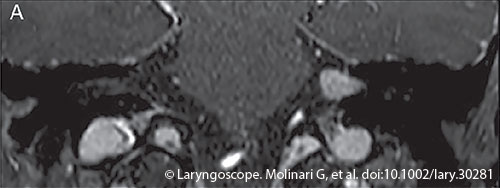Despite the accumulating evidence of feasibility, safety, and positive functional outcomes of the Expanded Transcanal Transpromontorial Approach, its spread has been restricted to few centers across the world.


Despite the accumulating evidence of feasibility, safety, and positive functional outcomes of the Expanded Transcanal Transpromontorial Approach, its spread has been restricted to few centers across the world.
Growing vestibular schwannomas (VSs) show higher signal intensities on Gd-enhanced MRIs and, therefore, measuring signal intensity of VS on Gd-enhanced MRI may aid in predicting VS growth.

Sterotactic radiosurgery (SRS) for the treatment of VS can be associated with increased balance symptoms, often within the first six months after treatment.
Findings did not demonstrate an association between tumor size and aspirin intake.
The current recommended MRI surveillance schedule includes MRIs at one, five, and 10 years postoperatively

Radiosurgical treatment of vestibular schwannomas is safe and effective.

Radiosurgical treatment of vestibular schwannomas is safe and effective
The MCID can be a useful tool to evaluate and compare group outcomes
MRI scans, microsurgery, and radiosurgery treatment modalities measured for quality-of-life impact

Sessions cover latest medical research, technology, issues in otolaryngology